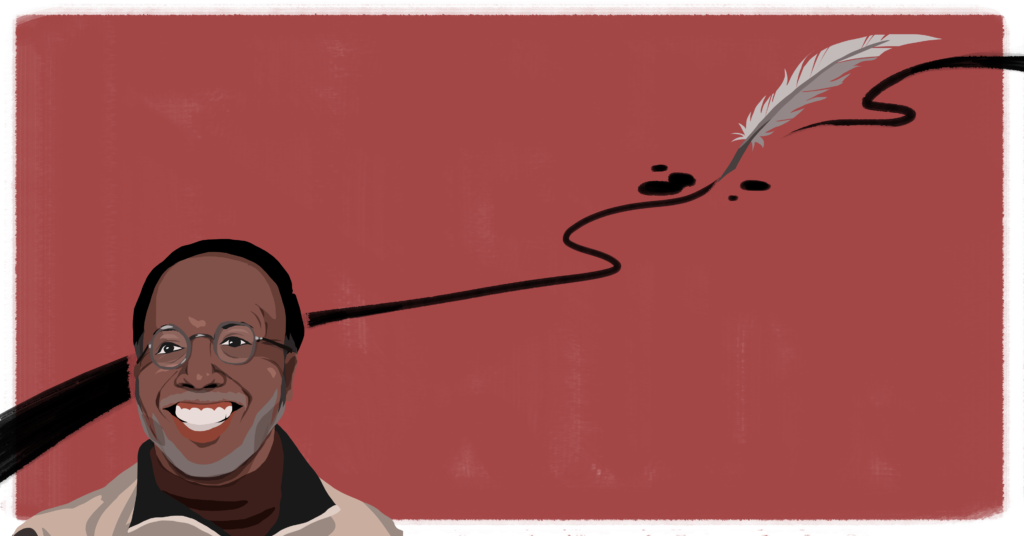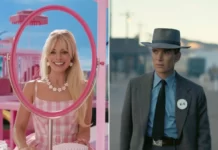
Typically, when I write articles for Imprint, the interviews I conduct last no longer than 20 minutes.
But for George Elliott Clarke, I didn’t know what to expect. I figured that since he is a former UW student and Editor-in-Chief (EIC) of our paper, Imprint, who is also Canada’s newest parliamentary poet laureate, my interview would probably be somewhat longer than my usual standard. After all, there are a lot of relatable things to talk about, and to become a country’s poet laureate, you’d probably have a lot to talk about regarding your past literary achievements.
The interview lasted two hours.
And frankly, I wish it could have gone on for longer.
I don’t know what I was more in awe about — the fact that this all-in-one poet, screenplay writer, columnist, freelance journalist, academic, and professor was able to accomplish so much within the past 30 years of his life, or the fact that he was able to talk about all of this in the most humble and eloquent way, with the most cheerful demeanor and contagious laughter I’ve ever heard.
But for many people, especially those who wish to pursue a career in creative writing, with many accomplishments come many hardships. This applied to Clarke as well.
By the age of 18, Clarke already had a passion for writing, especially poetry.
He met with a professor from Dalhousie University who offered him some advice.
“I’ll never forget it,” Clarke said. “It was a nice April day, 1978 … he read some of the poems I brought along … he looked at me and said ‘You are a poet. Congratulations.’” The professor then pulled out a standard rejection slip and handed it to Clarke.
“He said, ‘Get used to receiving these’,” Clarke said, followed by an immediate burst of laughter. To Clarke, this piece of advice was impactful.
“On one hand, there was this romantic presentation of the mantle of [the] poet, then this very realistic dousing of cold water … not everyone is going to like what you do … you have to have some intestinal fortitude to be able to get through and get beyond, and reject the rejection.”
And Clarke did just that. He rejected the rejections that many people gave him. From the rejection of his work, to the rejection of his race and his working class background, Clarke was able to carry that piece of advice with him for the rest of his life.
Clarke was born and raised in Nova Scotia, which, at the time, was not the most diverse of provinces in Canada. While he is proud to be a working class minority, he was often rejected by others for these traits.
At one point in his early life, Clarke worked as a painter for the Royal Canadian Navy in order to pay the bills.
“[It] was a very soul destructive piece of employment,” Clarke said. “Back in those days, 30 years ago, there were guys [who] didn’t mind walking around calling you the N-word.”
Because of his working class background, Clarke ended up at the University of Waterloo pursuing a bachelor’s degree in English studies, rather than going to other universities with more repute for their writing programs.
“I’ve got a simple answer,” Clarke said when asked why this was the case. “Co-op.”
From Clarke’s perspective, UW’s co-op program was a better way to pay off his tuition, rather than taking student loans and paying them off later.
“My parents were not really keen on debt, especially my father … I was going to have to be a self-funding student.”
While Clarke’s co-op jobs did help him pay off his tuition, they were not the most relative to what he wanted to pursue as a career.
His first two work terms consisted of controlling traffic signals by computer and editing computer manuals in Toronto, while his other two work terms consisted of working as an intern at the Legislature of Ontario. Clarke then spent his last work term studying poetry in Banff, which led to him to graduating without the co-op designation on his honours degree.
“I don’t think it totally crippled me,” he jokingly commented.
So with four unrelatable work terms, how did Clarke find opportunities to pursue more of a career in creative writing?
According to him, it was Imprint.
Clarke was in his final year at UW when he took his required literary criticism course. His professor was Paul Beam, an English professor who is still teaching at UW today.
While Beam is mainly noted for his contribution towards building a connection between co-op and the English studies program, it was his suggestion to his students to join Imprint that helped jump-start Clarke’s career in writing.
Imprint was still new at the time Clarke joined. Having replaced the formerly communist newspaper The Chevron in 1978, the paper was still in its early stages and had to deal with conflict from student groups on campus, such as the engineering students and the Federation of Students. There was even conflict within the paper itself, particularly between the paid staff members and the volunteers.
Paul Beam was very right when he asked our class back in the Winter of 1982: ‘Are any of you volunteering for Imprint?’ That’s what did it.
So when Clarke became EIC in May 1984, he was in for a ride. Again, he had to follow the advice of the Dalhousie professor from many years ago — reject the rejections from others.
Almost immediately after becoming EIC, the Federation of Students attempted to remove him from his position through a petition. According to Clarke, while the student union didn’t show its official support of the petition, it was obvious that it was initiated by them.
He also believed that the student union thought that he, as EIC, was secretly attempting to transform Imprint into the formerly communist Chevron.
“Frankly, I don’t mind saying it, race was part of the undercurrent,” Clarke said when asked about the motive behind the petition drive.
Clarke even had a student official from Feds directly telling him he was unacceptable as EIC.
“I carried forward that complaint of the particular student to the Ontario Human Rights Commission … I interpreted it as being a very sly and coded comment on my ethnic heritage.”
In the end, Clarke and the paper survived the race-driven rejections.
“We survived and went on to have great fun,” he said.
All in all, his time as a volunteer and EIC helped him prepare for “the real world.” From meeting multiple deadlines, to writing good quality work rapidly, and thinking creatively and imaginatively — these were all skills that he found to be very useful in the literary jobs he took after Imprint, including his job as a poet laureate today.
“Paul Beam was very right when he asked our class back in the Winter of 1982, ‘are any of you volunteering for Imprint?’ That’s what did it,” Clarke said.
One year after being EIC, Clarke went back to Nova Scotia. After working odd jobs, such as stuffing advertisements in newspapers, he was able to start a newspaper of his own. The Rap was its name and it was an eight-page monthly tabloid.
“It was totally my call, to print what I wanted,” Clarke said.
The Rap ran from 1986-1987 and managed to have several breakout stories, both locally and nationally. For Clarke, the result of this was becoming politician Howard McCurdy’s media relations assistant during the 1988 election. This counted as Clarke’s coursework completion for his MA at Dalhousie.
Aside from being a politician, McCurdy had many achievements under his belt. In 1959, he became one of the first black professors in Canada, teaching biology at the University of Windsor. He founded the Canadian College of Microbiologists and the Guardian Club, a civil rights movement that fought racial discrimination in the city of Windsor. McCurdy also ended up becoming Canada’s second black MP in the 1988 election that Clarke assisted him in.
Working with McCurdy had a huge impact on Clarke and it was these achievements that McCurdy accomplished that heavily influenced him.
“I wanted to be like Howard [McCurdy],” Clarke said.
As a result, he finished his master’s and decided to pursue a PhD at Queen’s University in 1990. It was during this time when Clarke was intrigued by writing and research on black Canadians and English Canadians.
“They’re both minority groups. Although white Canadians don’t often see themselves that way but they are … They are minorities in comparison to white Americans.”
And so, Clarke decided to write his dissertation on the similarities between the relationships of black and white Canadians and the relationship between black and white Americans.
Again, Clarke had to once again reject the rejections of his work. His PhD wouldn’t offer him financial support on this topic as they didn’t find it intriguing enough. Luckily, he didn’t need to worry too much.
“Howard [McCurdy] was so supportive of me that he didn’t let me quit,” Clarke said. This way he was able to have an income as a media relations assistant while pursuing his dissertation.
“It was great. Once again I avoided having to take student loans.”
On top of that, Clarke was also able to support himself by writing TV scripts for CBC and being a columnist for the Chronicle Herald, for which he still writes today.
Clarke was persistent with his research, despite it being rejected from many Canadian universities. Again, as a result from his persistence, his work received recognition at Duke University in North Carolina.
“I was hired almost immediately by Duke University, the number one English department on the planet at that point,” Clarke said.
But Clarke knew he couldn’t keep researching the relationship between black and white Americans.
“If I was going to do African-American stuff, I would be one of many thousands of PhDs … they would always have a huge advantage on me, being either American or African American.”
Because of this, Clarke decided to research more on African-Canadian literature, or as he likes to call it, “Africadian literature.”
“At the time, nobody was doing it,” Clarke said regarding his research. “Back then, 20 years ago, people thought that black Canadian writing [was] basically writing by Canadian immigrants from 1964 [onwards]. My research began to challenge that immediately.”
I find myself very lucky because I do see myself having two careers. I’m a scholar, but I’m also a creative writer. Not everyone gets to say that.
With his thorough research, Clarke essentially founded the field of African-Canadian literature. He would find works from African-Canadians from centuries back and analyze them. Because of Duke University’s keen interest, he was able to write 12 essays within three years, with each one delivering a new statement that changed the perception of African-Canadian literature.
From that point on, Clarke gained more and more recognition from other Canadian universities which resulted in multiple professor jobs at U of T, McGill, Harvard and eight honourary doctorates.
And during it all, the research, essays, dissertation, and educating students as a professor, Clarke continued to publish more of his own creative literary work that also focused on “Africadians.” From poetry, to novels, plays, screenplays, and even opera liberatis — each of Clarke’s works gained national recognition in Canada.
And now, as a parliamentary poet laureate for Canada, Clarke hopes to achieve much more for his country.
“We got some ideas that are pretty exciting,” Clarke said. “And not just for me but for others as well.”
One goal in particular includes creating a National Treasury of Poetry, a database that makes all Canadian poetry and all Canadian poets that are deemed as important by Canadians more electronically accessible. Clarke hopes to make sure that all types of poets from all across Canada are included.
“This would be [a] cowboy, fisherman, accountant, professor, bus driver anthology of poems we like, from coast to coast to coast,” Clarke said.
So there you have it. In a nutshell, this is George Elliott Clarke. A man who was able to reject the rejections of others and make a living out of his dreams as a writer.
For those who also want to achieve their dreams of making a living through creative writing, Clarke has plenty of advice. Besides the standard “work hard to achieve your dreams,” he follows a quote from English romantic poet William Blake: “Either create your own system, or be enslaved by another man.”
“If I can avoid it, why do I have to be at the bottom of somebody else’s pyramid? I can build my own pyramid and sit on top of it,” Clarke said when asked how he interpreted this. “Uncomfortably, but on top of it.” When reflecting on his life, Clarke agrees that he has been fortunate to be able to create, educate, and sustain himself through his work as a writer.
“I find myself very lucky because I do see myself having two careers,” Clarke said. “I’m a scholar, but I’m also a creative writer. Not everyone gets to say that.”
Graphic by Lea Clarin.
































